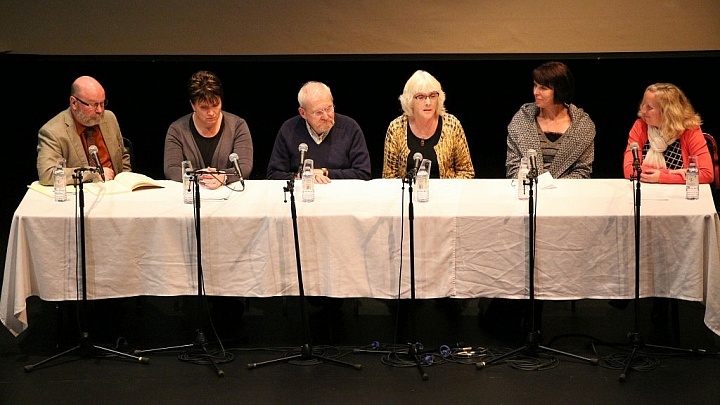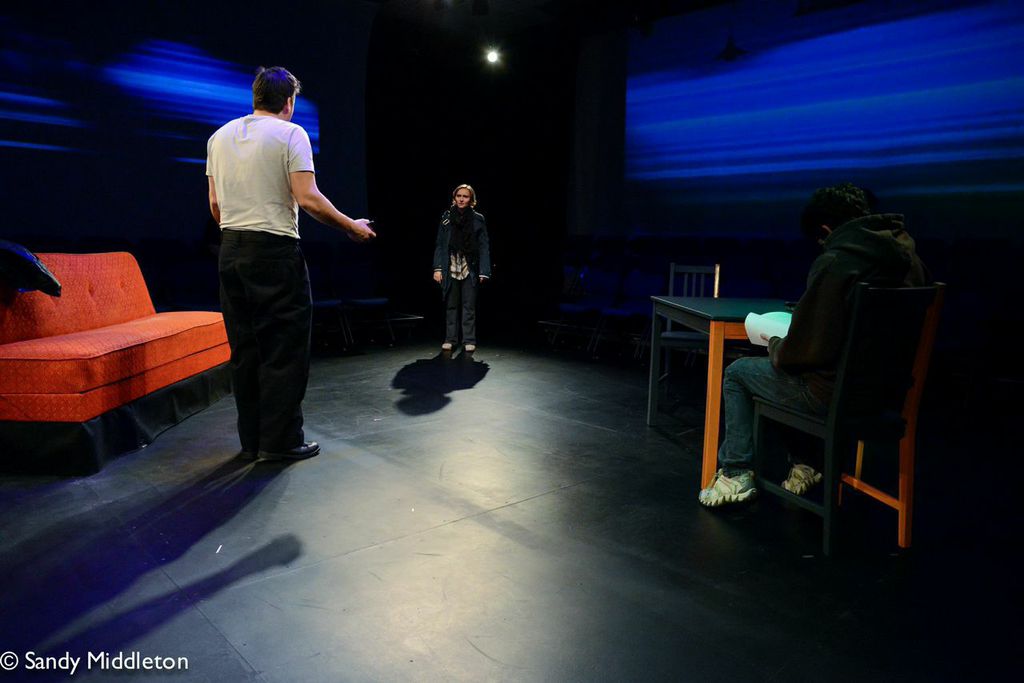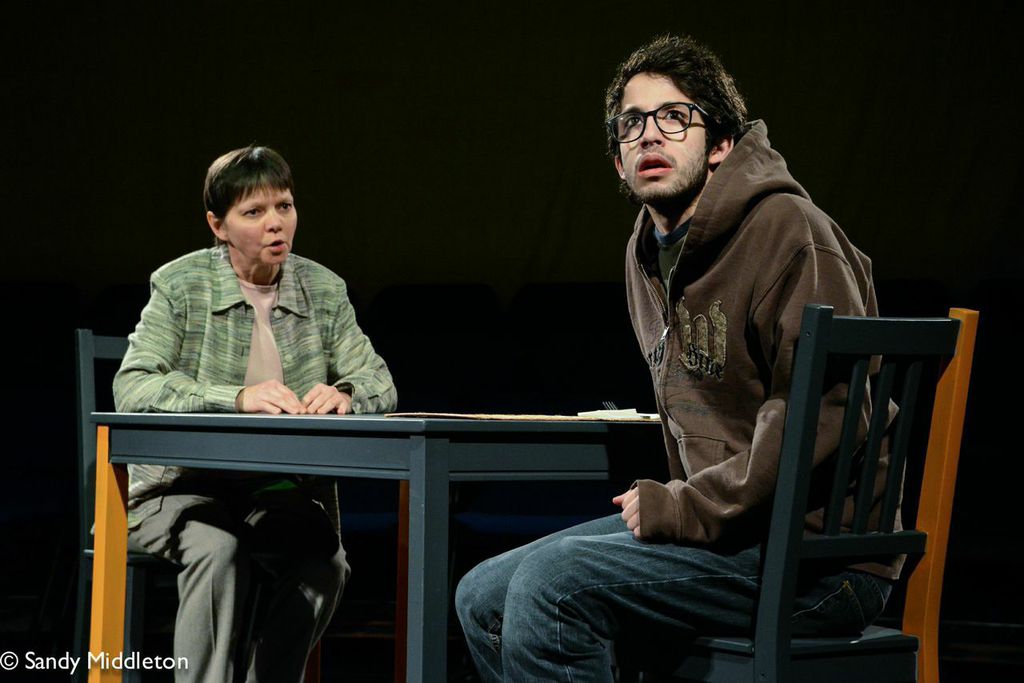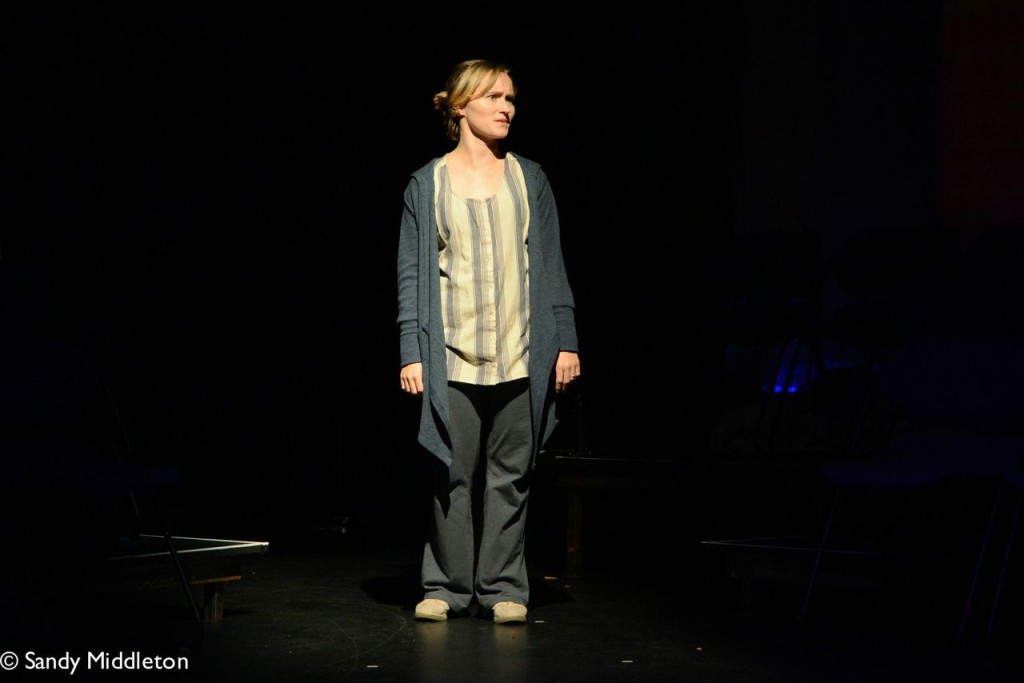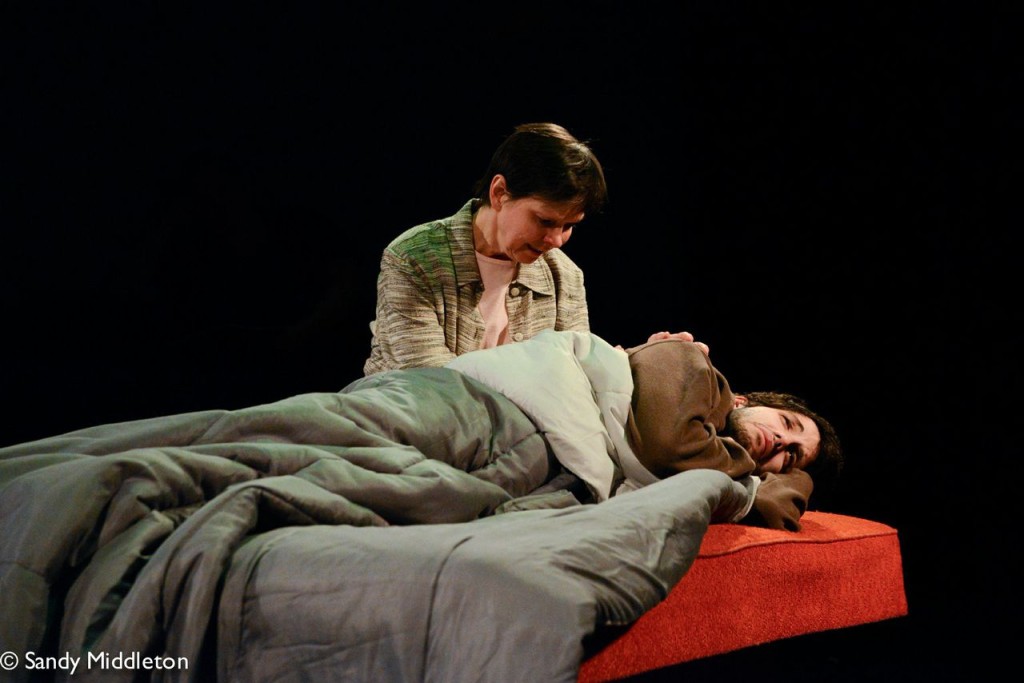For nearly two years, theatre lovers have felt entrapped in their own little purgatories. Artists have been unable to perform on stages, and audiences been...

Norris, McDonald, McCurdy-Meyers, MacLeod, Pizzingrilli, and Dufault at the Town Hall. Photos by David Vivian.
Elizabeth Amos, Christian Lange, Nicole Mitchell, Osasu Oke, and Josh Sanger write: With “Wellness Week” just having drawn to a close at Brock University, and exams looming on the horizon, there couldn’t have been a more apt time to bring the discussion about mental illness literally to our doorstep. Monica Dufault, artistic director of Essential Collective Theatre, in conjunction with ECT’s production of The Valley by Joan MacLeod, hosted a Town Hall Forum on November 17 at Brock University to discuss stigmas around and realities of mental illness. The showdeals with the depression and anxiety faced by many university students via its lead character, Connor, who drops out of his first year at the University of Calgary as he grapples with a mental health crisis. Dufault saw the mounting of this play as an opportunity to open up a wider discussion of the subject in the Town Hall, titled “Out of Our Minds”.
The panel featured the playwright Joan MacLeod, who was visited St. Catharines to see ECT’s production of her play, and a number of local experts: Barb Pizzingrilli, a RN with the Niagara Health System specializing in mental illness and addiction; Cindy McDonald, a long-time field officer now working as an instructor in the Police Foundation Program at Niagara College; Leslie R. McCurdy-Meyers, from Personal Counselling at the Brock Student Development Centre; and Brock Dramatic Arts professor Joe Norris (a specialist in pedagogical development and applied theatre), with Dufault as chair.
Responding to Dufault’s opening question about The Valley, MacLeod stated that she did not initially intend to write a play about mental illness, but rather about a specific instance of Canadian police brutality. “I never know where I’m going until I start,” said MacLeod, who ended up also drawing inspiration for The Valley from witnessing the struggles of her own students as a professor at the University of Victoria. Combined with an ever-deepening understanding of the realities of police interaction with those who are mentally ill, MacLeod landed on a play favouring thesis and antithesis over a preachy message.
Questions raised by Dufault and several curious audience members resulted in an “open mic” platform for many to share stories of their personal struggles with and viewpoints on mental illness and its impact. While the discussion took many avenues, one concern was pervasive: that as a society we are uninformed and ill-equipped to sensitively and effectively aid those suffering from mental illness. One of the first steps is getting rid of stigmas. “It’s us, not them,” Pizzingrilli stated, underlining that one in five of us will have a personal experience with mental health, and that we need to face it as a collective.

At right, actor Jason Cadieux, who played the police officer Dan in The Valley, responding to the Town Hall. Also pictured (from left) DART professors Virginia Reh and Karen Fricker, and DARTcritic Christian Lange
All members of the panel agreed that the media should work harder to avoid sensationalizing mental illness, and to be realistic in portrayals of the mentally ill. McCurdy-Meyers offered that only about six percent of people with mental illness are violent, and that the rest are mostly scared. That number is misrepresented as being much higher by portrayals in popular culture and unbalanced media coverage of events incidents involving those with mental illness. The same goes for police interactions with the mentally ill. McDonald, who worked closely with the team of The Valley in order to ensure a realistic representation of police methods and procedures, stated that very few police encounters with mental illness end without violence.
McDonald also admitted that because society still treats mental illness as taboo, organizations including police forces have frequently not been open or progressive about the subject internally. “We have not been looking after our own very well,” she said, though she optimistically added that many improvements have been made in assisting officers who have PTSD and emotional distress in recent years. The stigma of mental illness, however, still pervades society in a way that physical illness does not. “We don’t have the tools to discuss it,” stated MacLeod, opening a branch of conversation regarding the importance of language in approaching conversations on the subject. For example, saying that someone has mental illness rather than calling them mentally ill can have a great impact on perceptions and identifications. There is a difference between recognizing an illness, and recognizing a human being that is suffering from an illness.
The forum wound down with an alarming overview of the support available for those suffering from mental illness in the Niagara region. McDonald and Pizzingrilli concurred that the area is severely under-resourced. Typically, one psychiatrist should be available per 10,000 citizens to meet with demands, meaning the St. Catharines area alone should have access to 45-50 psychiatrists. At present, there are only 18 serving the area. Perhaps more disconcerting is the fact that across Canada there are only 450 psychiatrists specializing in paediatrics. With mental illnesses often manifesting themselves towards the end of adolescence, this is a demographic that cannot be ignored any longer. “It make sense to invest up front, early on,” says Pizzingrilli. More encouraging was the long list McCurdy-Meyers offered of services and support available to Brock students including free and confidential counselling, which over 1000 students a year already take advantage of.
Overall, the panel and the audience arrived at the conclusion that dialogues like this one are important to progress understanding and enable us to be better equipped to face the challenges of mental illness in our society. “We all live in a state of dis-ease,” said Norris, “it’s about the community, not necessarily the one with mental illness”. It was agreed that what we don’t talk about often becomes pathologized. Artworks such as The Valley and platforms for discussion like “Out of Our Minds” are opening the door to a dialogue that may help alleviate the stigma attached to mental illness, and will hopefully shift the focus to conquering it. Pizzingrilli said it best: “Recovery is possible. There are different ways people can be well”. Dufault’s work has started to raise awareness in St. Catharines, and we cannot afford to lose this momentum. We must keep talking about and recognizing mental illness with open minds and open hearts, in order to prioritize and normalize the phenomenon so people can be comfortable to seek help without fear. In The Valley it’s said that mental illness is like a huge swarm of dark birds that descends on us, but one by one they can fly away and we can step out into the world again; so let’s all keep our wings flapping.
The DARTcritics attended Essential Collective Theatre’s production of The Valley on Sunday, 16 November. Here are two of their reviews:
Spencer Walker writes: When someone loses a pet, we know what to say. When someone breaks up with a significant other, we know what to say. When someone is struggling with mental illness, what do we say? The Valley by Joan MacLeod explores mental illness as a complex issue in society today and provokes us to reflect on how we respond to a person who suffers from it.
Directed by Monica Dufault, The Valley is a heartbreaking tale of a first year university student named Connor (Andrew Pimento) who is struggling with his mental health. His mother, Sharon (Peggy Coffey), is a very concerned (and slightly clingy) parent who is trying her best to understand what her son is going through. Pimento’s explosive portrayal of Connor shows us an angry teenager whose depression slowly worsens as the story develops. Coffey gives us a kind and loving mother who is trying to stay strong despite what is happening to her son: after he has a mental health crisis and wields what is mistaken for a weapon on the subway, he is arrested and injured. Dan (Jason Cadieux) is a new father and the police officer who arrests Connor. His wife, Janie (Kelci Stephenson), is an ex-addict who struggles with her own depression as she raises their newborn son. Cadieux brings a strong and convincing quality to the police officer who is accused by Sharon of brutality against her son. Stephenson gives a powerful performance thanks to her ability to change with her character, as Janie develops from a mother struggling with a newborn to a woman overcome by depression.
As the audience surrounds the stage of The Valley, they are immersed by 360 degrees of video projections designed by the Brain Farm and haunting music by sound designer Ethan Rising. This environment, which admittedly is somewhat distracting at first, becomes a world we can’t escape as it mirrors the mental state of the characters in each scene.
Dufault’s naturalistic directing style creates a seamless, uninterrupted world in which we can experience these characters as if we are sitting in the same room as them. In our society that still stigmatizes mental illness, we struggle to provide resources for individuals who are experiencing these kinds of issues. The Valley simply demonstrates a story about mental illness and the effects it has on individuals and the people close to them. It is up to us if this will create a public dialogue about mental health so that one day, we will shed the stigma and know what to say.
Raylene Turner writes: Depression, anxiety, schizophrenia, post-partum depression, bipolar disorder, and post-traumatic stress disorder: these and many more are all categorized under the devastating disease that is mental illness. The Valley, written by Joan MacLeod, will immerse you in the world of its troubled characters and how mental illness affects their individual lives.
Director Monica Dufault decided to have the audience surround the stage (creating a theatre in the round effect), as well as placing large pieces of scrim behind us on all sides. Projected on the scrim are abstracted projections of the characters’ inner thoughts, also reflecting the moods of specific scenes happening onstage. The Brain Farm, an Emmy Award-winning creative production agency, designed these beautiful images. This decision was one that really benefits the audience in that we become fully involved in the play, as we are basically a part of the set.
Having the audience sit on all sides of the stage is a unique and wonderful experience. On top of being able to closely see the actors’ emotions, we are also able to see each other’s emotions. At times, I would look out into the audience and see just how engulfed people were by the performance. There was a deep, unspoken connection that existed in the room that enhanced the experience for everyone. It stemmed from being able to see and feel everyone’s reactions, emotions, and even hearing sniffles or muffled crying throughout the show.
The lighting, designed by Kate Leathers, captured the profound and heavy mood of the play. Between the mood-setting colours, beautiful textures, and intense spotlights, the lighting truly provoked emotion and furthered the audience’s immersion in the characters’ world.
The Valley revolves around an 18 year-old boy, Connor (Andrew Pimento), his progressive struggle with depression, and how this affects his mother, Sharon (Peggy Coffey). Their lives intertwine with a police officer, Dan (Jason Cadieux), when Connor’s depression causes him to have a violent episode on a subway train, and Dan has to get Connor under control. Dan’s wife Janie (Kelci Stephenson) is suffering from post-partum depression, and we see her journey parallel Connor’s throughout the play.
The Valley touches on many important factors that come with mental illness. The audience gets a first-hand experience of what living with someone with depression is like. Both Dan and Sharon feel the helplessness that comes when the person they love is suffering. The play also reflects how the disease if often misunderstood: Dan is constantly clueless as to what Janie is going through, and it only clicks for him when she contemplates ending her life. This happens all too frequently in the real world, and sadly, sometimes it’s too late. As for Sharon, she knows something is wrong with Connor but struggles between wanting to mother him and finding ways to benefit his well-being. Her mothering actions come across as somewhat selfish: she expresses a helpless concern for Connor, which only makes him agitated. She only wants him to feel better, but sometimes an overbearing mother can make things worse. It is harder for her to step aside, get professional help, and let Connor heal in whatever way he needs to.
The Valley truly makes the audience think, and raises awareness about the realities of mental illness. This is so important in our society, as many people suffer alone, and need their loved ones and those around them to better understand their illness. This play, though emotionally demanding, unravels mental illness and shows us the raw truth of its effects on those who are struggling with it.
Elizabeth Amos, Christian Lange, Nicole Mitchell, Osasu Oke, and Josh Sanger write: The date is fast approaching: Essential Collective Theatre’s production of The Valley has its first performances this weekend. And if the days are passing quickly for us, it must be a colourful blur for Monica Dufault (artistic director of ECT, and director of the production), stage manager Diane Konkin, and the rest of their team. Last Saturday, Dufault and Konkin graciously made space for us in their rather cozy rehearsal hall at the Sullivan Mahoney Courthouse to experience one of the first blocking rehearsals after days of “at the table” rehearsals.
The actors introduced themselves individually, and so it was we came to meet the talented people who would bring the characters we’ve read about to life: Kelci Stephenson plays Janie, Jason Cadieux plays her husband Dan, Andrew Pimento plays Connor, and Peggy Coffey plays his mother Sharon. There wasn’t a moment wasted and like the professionals they all are, everyone in the hall clicked into gear and launched right into the first scene of the day. It was a little surreal to watch, because, despite having just meeting these actors, it was difficult to see them as anyone but the characters they portrayed. They wore their characters like second skin and, when they dropped a line or asked to go back, it was slightly jolting to realize they were actors at one of their first rehearsals rather than a gruff, bitter police officer or a concerned, rehabilitated wife.
Following some repairs to the set by the crew, the cast launched right into a scene featuring Dan and Janie, which revealed their contrasting approaches to talking about their feelings, mainly Janie’s eagerness and Dan’s obstinacy. It was incredible to watch the group work as the actors had the freedom to explore, alter, and test at will, and appeared almost to dominate the rehearsal. Dufault, always there at the edge of the action, ever so gently shaped the process with suggestions, never a counterpoint but a furthering of ideas; her influence so subtle you weren’t sure she was really having any impact at all until you listened to the actor realize out loud what Dufault had suggested in a train of thought they felt was entirely their own. The result is a seamless blending of actor creativity and the director’s vision, likely indistinguishable unless, like us, you have the opportunity to observe the rehearsal process.
It was also a joy to watch Konkin and her ASM, Elizabeth Smith (a graduate of the Brock Dramatic Arts degree), deftly record and rerecord the blocking notes as the actors continued to alter it almost every single time. Konkin was more than on the ball, and had a great head for thinking through implications of new props and adjusting set pieces, but only brought up the most pressing issues on the spot so as not to interrupt the flow of the rehearsal.
As the day carried on and the actors warmed up the scenes rehearsed began to get emotionally heavier, and the last scene rehearsed while we were there was one of the most heart-wrenching. This was an exchange between Connor and his mother, and the first time we saw Pimento and Coffey perform, and it left more than a few teary eyes in the room. Thankfully Konkin had thought ahead and tissues were in ready supply. Consider this a formal warning to everyone coming to see the show November 15th: arm yourself with a sturdy hanky.
Mental illness and depression touch so many of us, speaking to each member of our community in a very personal way. And, while it is incredibly moving to watch it unfold on stage, Dufault’s hope, as well as that of playwright Joan MacLeod, is to open up a dialogue around mental illness in a literal, communal way. Recently, Niagara Health Systems in St. Catharines launched seven new Mental Illness and Addiction programs and bolstered its staff, with 105 new staff members and an additional eleven new psychiatrists coming on stream by this year. However, even with all these resources, the stigma attached to mental illness and the strong aversion to addressing the subject which permeates the city and the university, cannot be fully addressed without a community-wide conversation. MacLeod will be speaking as part of Town Hall forum called “Out Of Our Minds” on November 17th at Brock University’s Sean O’Sullivan Theatre. The forum aims to spark this necessary public discussion about mental illness, how we perceive it, how we approach it as a community, and how it is represented in media and society.
The production, for Dufault, is another way to participate in these conversations. She is building the work into a highly personal, communal experience that reflects the collective stories we share and presents mental health in a way we cannot ignore or separate from the people that we share this city, our home, with. Dufault is certainly living up to the company’s values which promise “stories that hold a mirror up to the Niagara Region and provoke conversations about its past, present and future” as well as “intimate and compelling theatre experiences”.
We spoke with Dufault, before we left the warmth of the Sullivan Mahoney Courthouse and faced the frigid chill settling over the streets of downtown St. Catharines, and expressed our excitement over the progress the show is making. “The actors are so amazing,” Dufault exclaimed, “I didn’t ask them to be off book for today, they took that on themselves! It’s all coming along so fast!” Incredibly fast. It feels like only the other day we first spoke with Dufault about her aspirations and the challenges she faced with mounting such a politically and emotionally charged piece; now opening night is almost here. With all the love and hard work poured into the production, it is safe to assume that the St. Catharines arts community will be abuzz with talk of The Valley. And, hopefully, St. Catharines will be talking about mental illness as well.
Elizabeth Amos, Christian Lange, Nicole Mitchell, Osasu Oke, and Josh Sanger write: Monica Dufault is a very busy woman. An instructor at Brock University who is very involved in the activities of the Dramatic Arts department, Dufault has recently taken over as the Artistic Director of Essential Collective Theatre in time for its 2014/2015 season. The arts scene in St. Catharines is growing with the addition of the new Performing Arts Centre, and Dufault aims to make ECT an important part of that growth. Dufault recently sat down with us at an early morning meeting in one of the few free hours she had to discuss this season’s first production: The Valley by Joan MacLeod. This was the beginning of our process as behind-the-scenes reporters.
Premiered last year at Alberta Theatre Projects in Calgary, The Valley circles around the intertwined lives of two families and deals with weighty issues such as police brutality and mental illness. We asked Dufault why she chose The Valley for her first project as Artistic Director with ECT. “Why do we create theatre?” asked Dufault, hinting that she looks for more than entertainment value in the projects she pursues. She was looking for a show that would engage the community in St. Catharines. ECT is publicly funded and believes that what they create should communicate something of value. Dufault saw a platform to achieve this in The Valley. “The play doesn’t answer any questions, but raises them,” said Dufault as she described the way in which the personal allegiances the audience creates with the characters of the play forces a reconsideration of our personal understanding of police brutality and mental illness.
In our city – where the median household income is the lowest among 11th major metropolitan areas in Ontario (according to Statistics Canada’s 2012 census), and the socioeconomic demographic is extremely divided – these issues become extremely relevant. There is an undeniable connection between mental illness and poverty, sometimes resulting in police involvement with controversial and ambiguous outcomes. We discussed the visibility of mental illness in areas of St. Catharines, knowing too that many more cases are not so easy to see. Dufault proposed that The Valley has the transformative power to “create community as a story we tell together,” communicating the value of the individual while making the audience look for answers together to the question of how we can create a “community of equals.”
Logistically, Dufault was looking for a play with a small cast, and she enthusiastically told us about the performers she has selected, each of whom comes with their own impressive resume. ECT founding member Jason Cadieux plays Dan, a policeman dealing with cases of mental illness both in the field and at home. Kelci Stephenson is Janie, his wife, who is struggling through postpartum depression and the memories of her troubled past. Andrew Pimento plays Connor, a college freshman who returns home deeply depressed and mentally unstable, and Peggy Coffey plays Sharon, Connor’s devoted and anxious mother. Dufault admitted that the fairly raw style of acting this play requires can be quite difficult as it asks actors to go to places that are emotionally challenging. It is clear Dufault feels her cast is prepared, however, and she confided that the moment she is most looking forward to is when rehearsals begin this week and she can finally “hear the actors speak these words.”
 From a production standpoint, The Valley is a technically and technologically ambitious undertaking for ECT, but this is part of Dufault’s vision for the company, involving a new aesthetic and re-evaluated production budgets. With the assistance of the Brain Farm design agency, Dufault plans to incorporate visuals and an extensive soundscape, involving both music and effects, to produce a unique environment for the world of the play. The detail of this environment is as exciting as it is challenging, and best left unrevealed in order to create a more engaging experience for audience members. Supplemented with lighting by Kate Leathers and costuming and props by Roberta Doylend, ECT expects surprising originality in the design of this show with Dufault anticipating that “the most challenging thing will be adapting to the technology and resources” involved, working to integrate the actors into the space and creating one cohesive environment.
From a production standpoint, The Valley is a technically and technologically ambitious undertaking for ECT, but this is part of Dufault’s vision for the company, involving a new aesthetic and re-evaluated production budgets. With the assistance of the Brain Farm design agency, Dufault plans to incorporate visuals and an extensive soundscape, involving both music and effects, to produce a unique environment for the world of the play. The detail of this environment is as exciting as it is challenging, and best left unrevealed in order to create a more engaging experience for audience members. Supplemented with lighting by Kate Leathers and costuming and props by Roberta Doylend, ECT expects surprising originality in the design of this show with Dufault anticipating that “the most challenging thing will be adapting to the technology and resources” involved, working to integrate the actors into the space and creating one cohesive environment.
What’s more exciting, the celebrated playwright of The Valley, Joan MacLeod, is travelling from Victoria to St. Catharines to be involved in the process. MacLeod will multitask during her visit, speaking to several Dramatic Arts classes at Brock University, including our own, as well as presenting a reading of her newest play in the hours before The Valley opens. Dufault is also taking the opportunity to involve MacLeod in a broader community dialogue about the play and the issues it raises. There will be a question and answer session following the opening night performance, and the discussion will continue in a Town Hall Forum in the Sean O’Sullivan Theatre on November 17 at 7:00pm. Called “Out of Our Minds,” this forum will revolve around definitions, perceptions, and represenatations of mental illness. “We have a responsibility in this story,” said Dufault. The discussion will ideally include representatives of the police, counseling services, and a healthcare professional in conjunction with MacLeod and facilitator Joe Norris.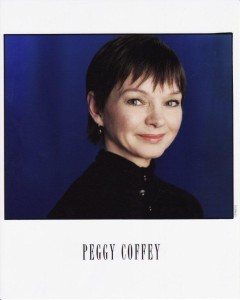
We spoke towards the end of our interview about the interesting coincidence that some of last year’s students in DART’s theatre criticism class were behind-the-scenes reporters in the successful Tarragon Theatre production of The Valley, in Toronto. It is exciting that a small company like ECT is producing this important play in our community only a year later, and that they have scored the coup of MacLeod’s visit; this also puts great pressure on the company and Dufault to succeed. From what we heard in our meeting, however, it seems that all involved are ready to take on the challenge. In fact, this seems like the perfect opportunity for the kind of progress Dufault hopes to bring to the company.
Relevant to all audiences, and particularly to university students like us, ECT’s production of The Valley promises to inspire thought, conversation, and hopefully applause. The show runs November 14-30 at the Sullivan Mahoney Courthouse Theatre. Tickets are available online at www.ectheatre.ca.
Related Posts
It’s been a few weeks since the final performance of Brock University Department of Dramatic Arts’ Fall Mainstage, Scenes from an Execution. Closing off their...
Here’s Holly Hebert’s final solo vlog from behind the scenes of the Fall 2020 DART Mainstage, Scenes from an Execution. She and Asenia will round off this...
It’s been a few weeks since the final performance of Brock University Department of Dramatic Arts’ Fall Mainstage, Scenes from an Execution. Closing off their...
Here’s Holly Hebert’s final solo vlog from behind the scenes of the Fall 2020 DART Mainstage, Scenes from an Execution. She and Asenia will round off this...
Leave a Reply (Cancel Reply)
Twitter Feed
Blogroll
DARTcritics.com is partially funded by the Marilyn I. Walker School of Fine and Performing Arts, in support of student learning; experiential education; student professionalization; public engagement with the teaching, learning and production activities of the Department of Dramatic Arts; new ways of thinking; and the nurturing of links with our communities.

